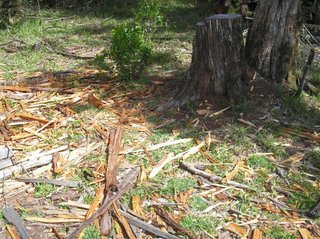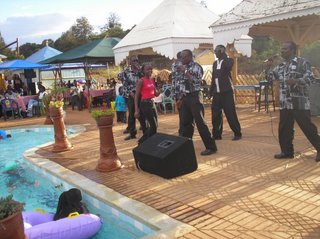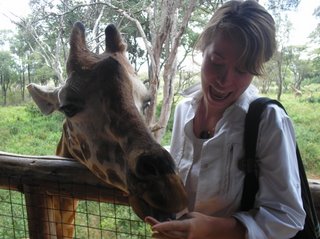
So L* was going up to stay at his property in Naru Maro, and also visit the Aberdere Mts (one of the last places to find untouched indigenous bamboo) and invited me to come and film. It was quite an opportunity into a part of Kenya that is difficult to see, the life of the past colonialists; the British that have hung on to their land and often fortunes, after Kenyan independence.
For me, it was much like I expected it to be: conservative politics and a beautiful property. They were wonderfully hospitable, as one would expect: tea time and fresh cakes 5 times a day, expensive wine for dinner, desert after every meal, huge English breakfasts, classical music, and cute English words like "chap". Probably because they allowed me to voice my very different opinion and view of history and were very honest about their own opinion, I was able to agree to disagree with them. A constant topic of debate was whether the british were actually "great" for Kenya. They said yes, because the British brought roads, healthcare, development (mostly for themselves, but sure a few Kenyans benefitted). I said no, first because I don't believe that development is necessarily a good thing (having money in your pocket doesn't mean happiness if your community is destroyed). But even if I did think development was good, my main argument for why the British were bad for Kenya and still are at fault for this country's problems are that the British destroyed the confidence of the Kenyans. They told them that their culture, religion, dress, everything was wrong. Then they told them that everything British was good. And even now development groups continue to tell Kenyans that they dont know anything. Development aid sometimes turns into another way to say, "you can't manage by yourselves". And that's why most Kenyans really lack confidence to take leadership roles, business risks, and oppose the status quo. Which makes it easy for others, like industry and corrupt politicians to take advantage of them. As Aileen has said " we are an African shell, on the inside we are very confused about what is right and wrong and what we believe". And I also see the greed and the crime from greed are a consequence of that lack of confidence. I'll try and quote Thomas who said, "you find that with time here you start looking at things with a "whats in it for me" attitude, and that attitude is not part of the Kenyan heart, but is learned because everyone here is competing and trying to take all the credit and leave you with nothing. You end up realizing that if you don't do the same, no one will ever give you what you deserve. "
So the dominate belief in the house was: Capitalism is the only way. Bush is doing the right thing, to keep power in the right people. Conquest has been happening for centuries, so it makes sense to take over and detroy other cultures. You must use force with “these guys”. Listening to their debate, I realized that their opinion makes sense for them in their position. And I don’t hate them for their position, but what's best for my people is whats worse for theirs, since my people are not the wealthy and powerful, but often the ones taken advantage of. I was impressed that L* and his brothers were fluent in Swahili though, which is usually a sign of humility as far as the local people are conserned, but their knowledge is mostly from having a Kenyan nanny growing up rather then pure desire of their own. The family, especially the mother, was very religious and would not approving of a daughter-in-law from a non-cultured background or non-Christian upbringing and morals. Which is the contradictory part of their political and religious beliefs: how can you be a good Christian and yet prescribe to a "might makes right" philosophy that is totally against everything Christ teaches?
They did have a point that when the British were around there wasn’t much deforestation, because all the land was privately owned. Course now that I think about that debate, I would argue that we (white people) are the ones that destroyed the systems in place (like chiefs and tribes) that controlled greed in the past by inflicting strong social consequences for them. I’m sure L* would say the African slave traders were definitely greedy but that wasn’t the majority of Kenyans.

We went for a drive to see all the illegal deforestation going on nearby. There were plenty of charcoal pits. At night people come and cut one tree at a time, and often cut it into wood or make charcoal there in the forest, then carry it out on their backs, bicycle or donkey. The plumes of smoke are very visible at night, so if the forest department wasn’t in on it, they could squash the business fairly easy.


Got up at 5:00am to head to the Aberderes Mts with the L* and his father. Much like you would expect a national park in the mountains to be, it was heavily forested, cold, and green. There is only one road in and one road out, so it is not a prime spot for illegal harvesting. The park was absolutely gorgeous, and we were the only people there! We saw lots of buffalo, an elephant, and some bush buck, worthogs, and birds. I had no idea that there were elephants living in the forest who apparently like eating and rubbing up against bamboo.

Bamboo was everywhere and very tall...

We ate a nice breakfast on a hill side, then L* and his father went fishing at the river. I wandered about nervously, since L* warned me there were elephants, buffalo, and possibly even lions (although most had been killed). I carried around a shovel, but still was hesistant to really explore, since being mauled by a frightened elephant didn’t sound like the type of adventure I was looking for.



All in all, I enjoyed staying with the family. They were very warm and friendly. However it is interesting how much of a “white man’s manifest destiny” is still a part of their thinking. I imagine this is the line of thinking Bush and his cronies subscribe to as well. Its fairly easy to think this way if you don't have close contact with poorer people on a equal footing basis.
“You got to be hard on these guys. They don’t want peace”, was a phrase of this family, and of Bush on Iraq. But where is that line of thought coming from? Every Kenyan I know wants peace and wanted it even as they fought for independence. Every person I think wants peace. It is easy to dehumanize that which you dont want to understand. No one at L* has ever lived with Kenyans in a Kenyan home or dealt with Kenyans outside the power structure of "white makes right". And neither have the people in the US that think the Muslims dont want peace. What they want is some dignity, self-determination, and their own culture, which we make almost impossible to have without resorting to extremely violent ways.
We (Americans, British, ect) are the ones with the incentive for war, since we make most our money off war, weapons, and then rebuilding places, we gain from all of it, not them. So who really is fighting for peace?


































